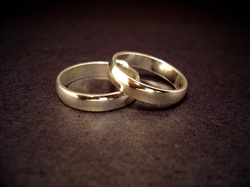 “I, __________, in the presence of God and these witnesses, take you, __________, to be my wife/husband, to have and to hold from this day forward, for better, for worse, for richer, for poorer, in sickness and in health, to love and to cherish, until death parts us, and I pledge you my faithfulness.” Love requires law. This statement sounds backwards in our modern society. It sounds odd because we typically associate love with free and spontaneous passion. When you bring “laws” to love, then it would seem restrictive and stifling. Law, rules, and duty seem to be the antithesis of love’s passion. The biblical nature of covenant gives us a picture of how “law” actually makes for deeper, more intimate love. In the Bible, God makes a binding promise to his people (Gen. 17:1-14; Psalm 105:8-11). In spite of their unfaithfulness and failings, he binds himself in a legal and contractual format called a covenant. Most contracts are quid pro quo, this for that. But God’s covenant with his people is different. While there are obligations for his people, God’s love for them is not predicated on their obedience. His love is the foundation. His covenant is proof of that love, and a call for them to respond in obedience. Marriage gives permanence to love by linking love with law. In marriage, you aren’t just saying, “I love you.” You’ve probably done that already. In marriage, you are cementing that love, binding yourselves together by vows. The "law" of the vows is done first and foremost before God. Second, the vows are binding before those gathered to witness your public declaration. Third, they exist as legally binding before the state. Tim Keller writes, “Real love desires permanence . . . So the ‘law’ of vows and promises fits our deepest passions at the present. But it is also something the love of our heart needs in order to have security about the future.” The law ensures safety and security. The binding law of wedding vows offer love a safe and secure place. Bound by this law, I can show my wife my deepest vulnerabilities, insecurities, and scars. And after she has seen the worst of me, I know she won’t leave. Her love has proven itself in vows. The binding “law” of vows makes marriage far more significant than “dating” or “living together.” The “law” of marriage makes love tangible and concrete. Marriage is a binding promise that shows love at a deeper level. Together, love and law make something far more durable, binding, and unconditional. Comments are closed.
|
JOIN My Tribe
|


